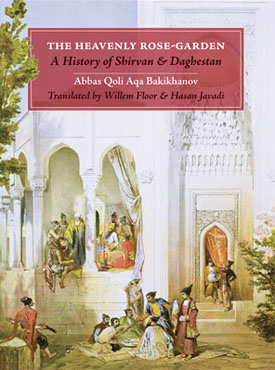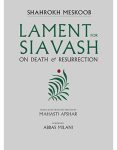About the Book
The Heavenly Rose-Garden is a fascinating portrait of the Caucasus at the dawn of the modern era. Written in Persian and completed in 1845, it offered the first look at the region by a native son, ‘Abbas Qoli Aqa Bakikhanov. It remains the only dedicated history of Shirvan and Daghestan to this day and also contains a great deal of interesting information about the Caucasus in general during the eighteenth and nineteenth centuries. Bakikhanov demonstrates that despite differences in language, religion, and ethnicity, all the peoples of the Caucasus traveled a similar historical road and, to some extent, shared an identity distinct from the Ottoman Turks and Persians of adjacent, larger states.
Translated for the first time into English by two eminent historians, The Heavenly Rose-Garden is a mine of information for scholars studying the region and an engrossing read for anyone else.
About the Author
Abbas Qoli Aqa Bakikhanov was an Azerbaijani journalist, linguist, poet and philosopher. A scion of the Khan of Baku, he was born there in 1794. From 1820 to 1845 he served as a secretary and translator in the Russian army, which had taken over most of the Caucasus in previous decades. Throughout this time he traveled widely, carried out ethnographic studies and kept his ties with the literary establishment of the Caucasus, centered in Tiflis in present-day Georgia. He died in 1847.
Willem Floor studied development economics and non-western sociology, as well as Persian, Arabic and Islamology from 1963-67 at the University of Utrecht (the Netherlands). He received his doctoral degree from the University of Leiden in 1971. Since 1983, Dr. Floor has been employed by the World Bank as an energy specialist. Throughout this time, he has published extensively on the socio-economic history of Iran. His books include: Public Health in Qajar Iran, Agriculture in Qajar Iran, and The History of Theater in Iran, as well as, The Persian Gulf: A Political and Economic History of 5 Port Cities, 1500-1730, its second volume, Persian Gulf: The Rise of the Gulf Arabs, 1747-1792, third volume, The Rise and Fall of Bandar-e Lengeh, the fourth volume, Bandar Abbas: The Natural Gateway of Southeast Iran, and the fifth volume, The Persian Gulf: Links with the Hinterland Bushehr, Borazjan, Kazerun, Banu Ka’b, & Bandar Abbas. He has also published, Travels Through Northern Persia, 1770-1774, Titles and Emoluments in Safavid Iran, and A Social History of Sexual Relations in Iran; Labor and Industry in Iran, 1850-1941; Guilds, Merchants and Ulama in 19th Century Iran; The Rise and Fall of Nader Shah; Games Persians Play. His translations include: Samuel Gottlieb Gmelin’s Travels Through Northern Persia 1770–1774 , and with Hasan Javadi, Abbas Qoli Aqa Bakikhanov’s The Heavenly Rose-Garden: A History of Shirvan & Daghestan; Evliya Chelebi’s Travels in Iran and the Caucasus, 1647 and 1654; A Man of Two Worlds: Pedros Bedik in Iran, 1670–1675, The Persian Gulf: The Hula Arabs of The Shibkuh Coast of Iran, and The Persian Gulf: Dutch-Omani Relations A Commercial & Political History 1651-1806.
Hasan Javadi was born in Tabriz, Iran to a distinguished family of administrators and scholars. He has taught English and Persian literature at the University of Cambridge, Tehran University and the University of California at Berkeley. He is the author and translator of numerous books, including Satire in Persian Literature, and Persian Literary Influence on English Literature. For Mage he translated Obeyd-E Zakani: Ethics of the Aristocrats and Other Satirical Works. His translations include: Forough Farrokhzad’s Another Birth and Other Poems, and with Willem Floor, Abbas Qoli Aqa Bakikhanov’s The Heavenly Rose-Garden: A History of Shirvan & Daghestan; and Evliya Chelebi’s Travels in Iran and the Caucasus, 1647 and 1654. He edited Letters From Tabriz: The Russian Suppression of the Iranian Constitutional Movement.
Now retired, Dr. Javadi lives in the Washington DC area, where he is working on original scholarship and translations of Persian literature.








